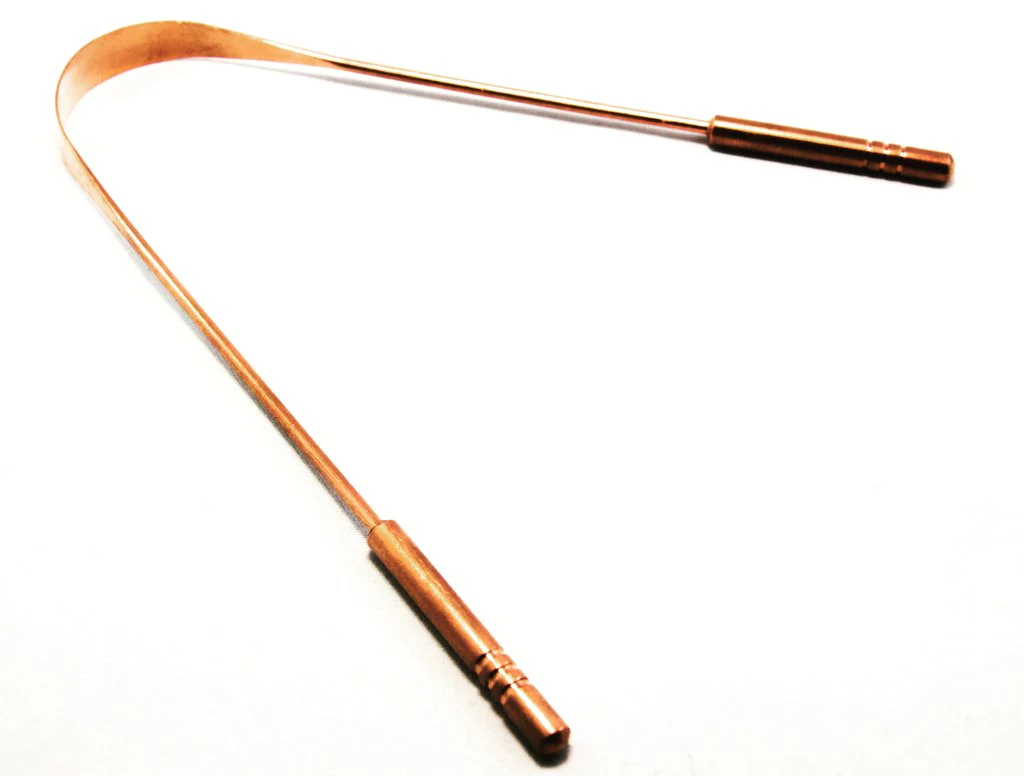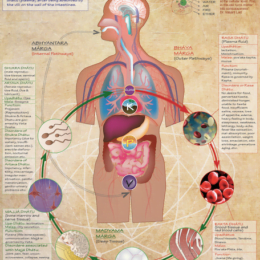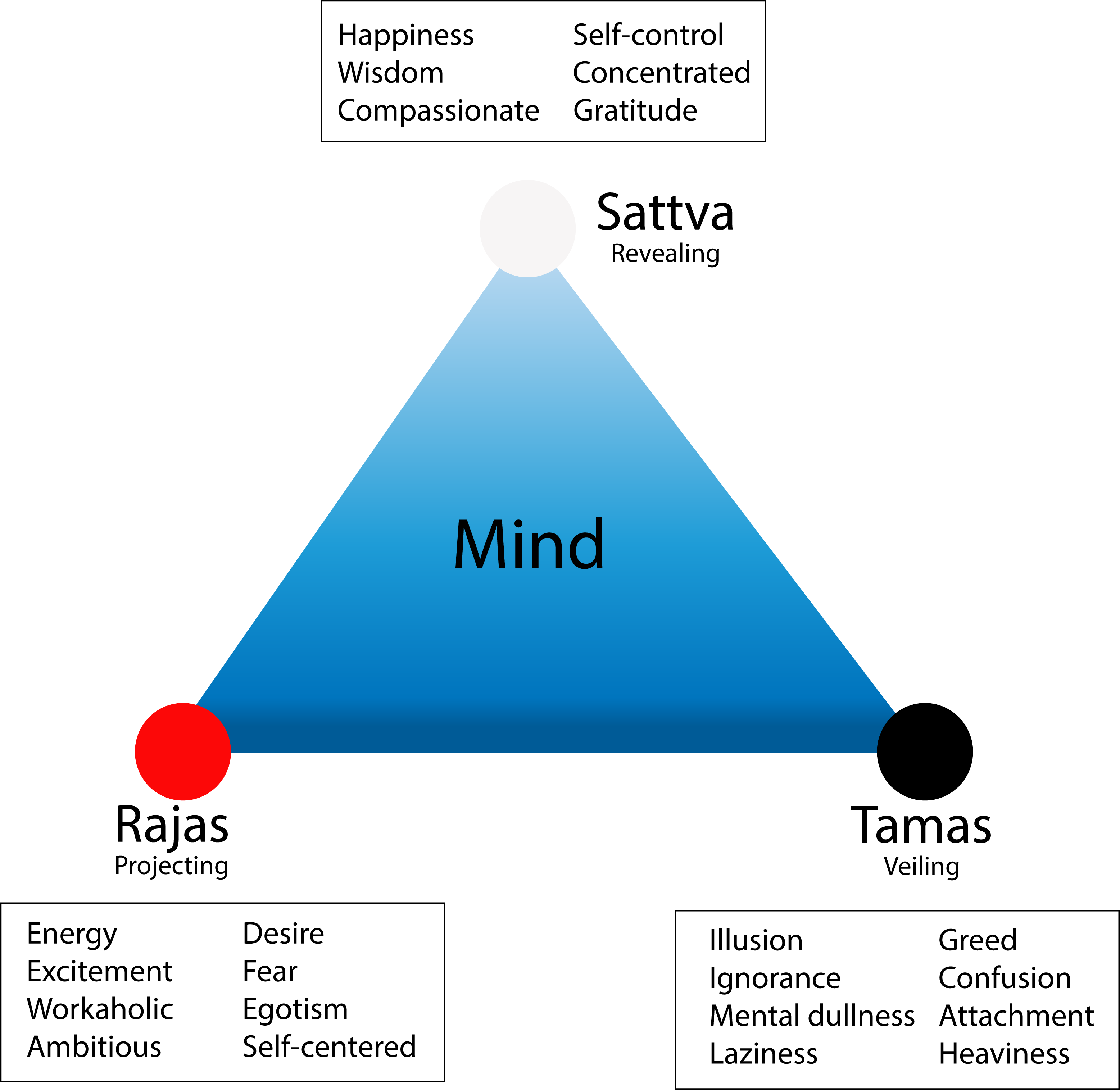
Overnight, as the body processes everything that was ingested that day, toxins (called Ama in Ayuveda) begin to form, and are visible as a coating on the tongue. If the Ama is more of the Kapha variety, it will appear as a thick, white coating. Pitta Ama tends to be more yellow, and Vata Ama is brown. Scraping the coating off first thing in the morning prevents reabsorption of the toxins that your body worked so hard to expel.
Tongue scraping, or jihwa prakshalana, is a traditional part of Ayurvedic self-care and also a great way to check in with your body each morning. Notice the color of the coating as well as the quantity. The amount can be a good indication as to whether or not your body was able to digest the food you consumed the previous day.
For example, I notice that when I eat heavier foods such as hamburgers or ice cream I tend to have a thicker coating on my tongue the next morning. According to Ayurveda, these toxins cause obstructions in respiration, as well as foul-smelling breath. The coating they produce can interfere with our ability to taste, clouding this sense organ and even creating unhealthy cravings.
Ayurveda considers the tongue a road map of the entire body, with each section corresponding to a different organ. When we scrape the tongue, it’s like giving our internal organs a gentle massage.
Daily Rituals (Dinacarya)
Tongue scraping is considered a morning ritual in India, something you do on daily in the basis which they called it “Dinacarya” in Sanskirt.
How to Tongue Scrape
- Scrape your tongue first thing in the morning, before drinking water.
- Use either a stainless steel or copper tongue scraper. There are plastic tongue scrapers out there, but they are harder to keep sanitary.
- Stick your tongue out and allow it to be loose and heavy.
- Work the tongue scraper back to front five to seven times, rinsing the scraper after each round. Follow with brushing, flossing, and a large glass of warm or room temperature water. Drinking warm water first thing provides a gentle flush for the GI tract and the kidneys, and also stimulates peristalsis.
Benefits of Scraping the Tongue
1. Better sense of taste
Better sense of taste. Scraping removes dead cells and other unwanted substances and creates space for taste buds to function naturally. One can experience different tastes better and in a more distinguishable way.
2. Natural color of the tongue
It helps the natural color of the tongue to emerge by removing the discoloration and debris, returning the tongue to its soft pink and clean state.
3. Removes bad breath
At night while we sleep, bacteria gather in the mouth because the production of saliva is reduced. Tongue scraping removes these bacteria, which are responsible for creating bad breath and tooth decay.
4. Better digestion
Digestion of food starts in the mouth. Enzymes present in the saliva break food down for easier digestion by the gut. When the taste buds are blocked due to the accumulated mucus on the tongue, the messaging function of their receptors conveying to the brain to activate relevant enzymes required for digestion of the food is impaired.
5. Activates organs
Since the tongue is connected to various organs of the body, scraping it gently activates related organs too.
Guidelines for Scraping the Tongue
- Use as scraper made of gold, silver, copper.
- Should be strong, and have a gentle, rough edge.
- Tongue should be scraped every time after cleaning teeth.
Types of Tongue Scrapers
- Gold – Recommended
- Silver – Recommended
- Copper – Recommended
- Stainless Steel
- Plastic

Conclusion
Once you start a regular practice of tongue scraping, you will be hooked. After a few weeks, you will notice a significant difference. Your mouth will feel fresher and your taste buds more alive.
Talk to a Holistic Ayurvedic Coach
Talk to a Holistic Ayurvedic Coach to find out other Daily Rituals (Dinacarya), to help you feel and think better.

Free 60 Minute Consultation
Completely free of charge, 60 Minute Consultation

Dietary Advise
Advise on dietary choices based on Doshas and the six tastes

Daily Routines
Create daily and nightly routines based on constitution, age and the seasons

Ayurvedic Principles
Ayurvedic principles including the holistic view of health, the elements, Doshas

Location
Online meeting, phone call or in person at coffee shop/park nearby Charlottesville, VA

Yoga Advise
Recommend yoga and yogic practices for improved health, including pranayama/breathwork





